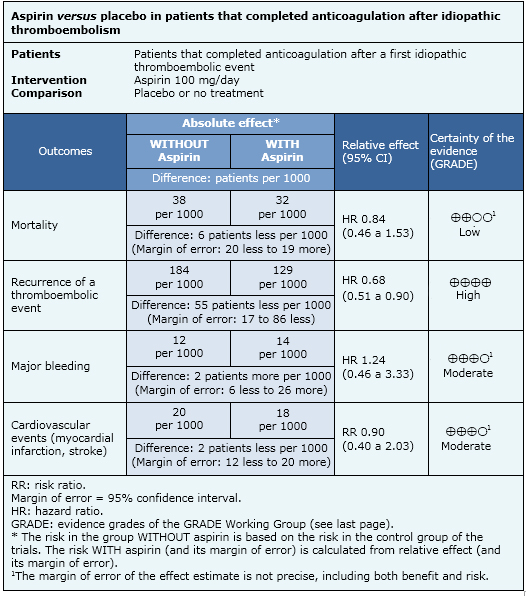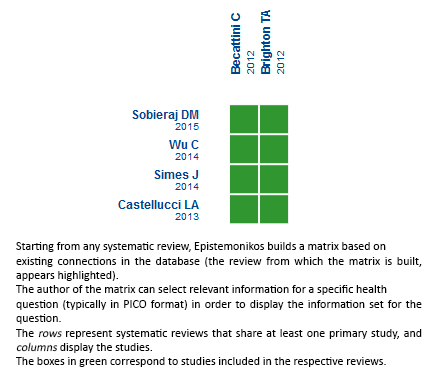 Para Descargar PDF debe Abrir sesión.
Para Descargar PDF debe Abrir sesión.
Idiopathic thromboembolic disease presents a high risk of recurrence. There is controversy about the effects of aspirin in reducing this risk after the completion of anticoagulant treatment. Searching in Epistemonikos database, which screens 30 databases, we identified four systematic reviews that together include two randomized trials. We combined the evidence using meta-analysis and generated a summary of findings table following the GRADE approach. We concluded that aspirin administered after having completed anticoagulation reduces the risk of recurrence, probably without importantly increasing the risk of hemorrhage.
Patients with idiopathic venous thromboembolism have a high risk of recurrence once anticoagulation treatment is stopped. These patients also have a greater risk of cardiovascular events compared with the general population (myocardial infarction, stroke). Use of aspirin could lower the venous and arterial thromboembolic risk without increasing the risk of hemorrhage. Current guidelines do not mention the role of aspirin as a secondary prevention strategy in these patients.
We used Epistemonikos database, which is maintained by screening more than 30 databases, to identify systematic reviews and their included primary studies. With this information, we generated a structured summary using a pre-established format, which includes key messages, a summary of the body of evidence (presented as an evidence matrix in Epistemonikos), meta-analysis of the total of studies, a summary of findings table following the GRADE approach and a table of other considerations for decision-making.
|
Key messages
|
|
|
We found four systematic reviews [1],[2],[3],[4] that evaluated this question, which included two randomized controlled trials [5],[6]. |
| What types of patients were included. |
Patients with a first idiopathic thromboembolic event (deep vein thrombosis and/or pulmonary embolism) that completed initial anticoagulation (warfarin, low molecular weight heparin or new anticoagulants). |
|
What types of interventions were included. |
Aspirin 100 mg once daily for at least two years. |
|
What types of outcomes were measured. |
Thromboembolic recurrence; major vascular events (acute myocardial infarction, stroke); cardiovascular mortality; overall mortality; major bleeding; minor clinically significant bleeding. |
Summary of findings
The following information is based on two randomized trials that included 1224 patients.

|
To whom this evidence does and does not apply |
|
| About the outcomes included in this summary |
|
| Balance between benefits and risks, and certainty of the evidence |
|
| What would patients and their doctors think about this intervention |
|
| Resource considerations |
|
|
Differences between this summary and other sources |
|
| Could this evidence change in the future? |
|
How we conducted this summary
Using automated and collaborative means, we compiled all the relevant evidence for the question of interest and we present it as a matrix of evidence.
Follow the link to access the interactive version Aspirin for reducing recurrence after completing anticoagulant treatment for an idiopathic thromboembolic event

The upper portion of the matrix of evidence will display a warning of “new evidence” if new systematic reviews are published after the publication of this summary. Even though the project considers the periodical update of these summaries, users are invited to comment in Medwave or to contact the authors through email if they find new evidence and the summary should be updated earlier. After creating an account in Epistemonikos, users will be able to save the matrixes and to receive automated notifications any time new evidence potentially relevant for the question appears.
The details about the methods used to produce these summaries are described here http://dx.doi.org/10.5867/medwave.2014.06.5997.
Epistemonikos foundation is a non-for-profit organization aiming to bring information closer to health decision-makers with technology. Its main development is Epistemonikos database (www.epistemonikos.org).
These summaries follow a rigorous process of internal peer review.
Conflicts of interest
The authors have completed the ICMJE uniform disclosure form for potential conflicts of interest, (available on request from the corresponding author), and declare not having conflicts of interest with the subject of the article.

 Matrix of evidence
Matrix of evidence
 Esta obra de Medwave está bajo una licencia Creative Commons Atribución-NoComercial 3.0 Unported. Esta licencia permite el uso, distribución y reproducción del artículo en cualquier medio, siempre y cuando se otorgue el crédito correspondiente al autor del artículo y al medio en que se publica, en este caso, Medwave.
Esta obra de Medwave está bajo una licencia Creative Commons Atribución-NoComercial 3.0 Unported. Esta licencia permite el uso, distribución y reproducción del artículo en cualquier medio, siempre y cuando se otorgue el crédito correspondiente al autor del artículo y al medio en que se publica, en este caso, Medwave.

Idiopathic thromboembolic disease presents a high risk of recurrence. There is controversy about the effects of aspirin in reducing this risk after the completion of anticoagulant treatment. Searching in Epistemonikos database, which screens 30 databases, we identified four systematic reviews that together include two randomized trials. We combined the evidence using meta-analysis and generated a summary of findings table following the GRADE approach. We concluded that aspirin administered after having completed anticoagulation reduces the risk of recurrence, probably without importantly increasing the risk of hemorrhage.
 Autores:
Andrés Valenzuela[1,2], Andrés Aizman[1,2]
Autores:
Andrés Valenzuela[1,2], Andrés Aizman[1,2]

Citación: Valenzuela A, Aizman A. Does aspirin reduce recurrence after completing anticoagulant treatment for an idiopathic thromboembolic event?. Medwave 2015 Abr;15(3):e6118 doi: 10.5867/medwave.2015.03.6118
Fecha de publicación: 9/4/2015

Nos complace que usted tenga interés en comentar uno de nuestros artículos. Su comentario será publicado inmediatamente. No obstante, Medwave se reserva el derecho a eliminarlo posteriormente si la dirección editorial considera que su comentario es: ofensivo en algún sentido, irrelevante, trivial, contiene errores de lenguaje, contiene arengas políticas, obedece a fines comerciales, contiene datos de alguna persona en particular, o sugiere cambios en el manejo de pacientes que no hayan sido publicados previamente en alguna revista con revisión por pares.
Aún no hay comentarios en este artículo.
Para comentar debe iniciar sesión
 Medwave publica las vistas HTML y descargas PDF por artículo, junto con otras métricas de redes sociales.
Medwave publica las vistas HTML y descargas PDF por artículo, junto con otras métricas de redes sociales.
 Castellucci LA, Cameron C, Le Gal G, Rodger MA, Coyle D, Wells PS, et al. Efficacy and safety outcomes of oral anticoagulants and antiplatelet drugs in the secondary prevention of venous thromboembolism: systematic review and network meta-analysis. BMJ. 2013 Aug 30;347:f5133. | CrossRef | PubMed |
Castellucci LA, Cameron C, Le Gal G, Rodger MA, Coyle D, Wells PS, et al. Efficacy and safety outcomes of oral anticoagulants and antiplatelet drugs in the secondary prevention of venous thromboembolism: systematic review and network meta-analysis. BMJ. 2013 Aug 30;347:f5133. | CrossRef | PubMed | Castellucci LA, Le Gal G, Rodger MA, Carrier M. Major bleeding during secondary prevention of venous thromboembolism in patients who have completed anticoagulation: a systematic review and meta-analysis. J Thromb Haemost. 2014;12(3):344-8. | CrossRef | PubMed |
Castellucci LA, Le Gal G, Rodger MA, Carrier M. Major bleeding during secondary prevention of venous thromboembolism in patients who have completed anticoagulation: a systematic review and meta-analysis. J Thromb Haemost. 2014;12(3):344-8. | CrossRef | PubMed | Simes J, Becattini C, Agnelli G, Eikelboom JW, Kirby AC, Mister R, et al. Aspirin for the prevention of recurrent venous thromboembolism: the INSPIRE collaboration. Circulation. 2014 Sep 23;130(13):1062-71. | CrossRef | PubMed |
Simes J, Becattini C, Agnelli G, Eikelboom JW, Kirby AC, Mister R, et al. Aspirin for the prevention of recurrent venous thromboembolism: the INSPIRE collaboration. Circulation. 2014 Sep 23;130(13):1062-71. | CrossRef | PubMed | Sobieraj DM, Coleman CI, Pasupuleti V, Deshpande A, Kaw R, Hernandez AV. Comparative efficacy and safety of anticoagulants and aspirin for extended treatment of venous thromboembolism: A network meta-analysis. Thromb Res. 2015 Mar 4. pii: S0049-3848(15)00104-8. | CrossRef | PubMed |
Sobieraj DM, Coleman CI, Pasupuleti V, Deshpande A, Kaw R, Hernandez AV. Comparative efficacy and safety of anticoagulants and aspirin for extended treatment of venous thromboembolism: A network meta-analysis. Thromb Res. 2015 Mar 4. pii: S0049-3848(15)00104-8. | CrossRef | PubMed |